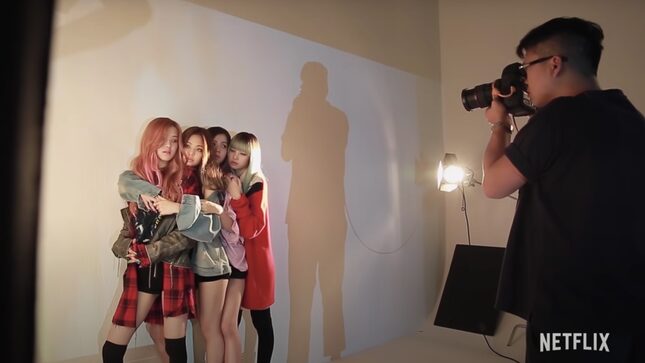In Netflix's Blackpink: Light Up the Sky, the World's Biggest Girl Group Reintroduces Itself
EntertainmentMovies

Blackpink: Light Up the Sky, Netflix’s documentary on the biggest girl group on the planet—let alone in K-pop—begins the second Blackpink was introduced to the world: during their debut in 2016, a career carefully launched with near militaristic precision. The opening shot depicts dozens of employees in Seoul, lined up in front of computers, preparing to launch YG Entertainment’s first new girl group in seven years. (Their predecessor was the ineffable 2NE1, one of the most successful and popular girl groups in South Korea, perhaps best known in the U.S. for the solo career of CL. Consequently, Blackpink, without having committed a harmony to record, had big shoes to fill.)
As the employees type, four silhouettes in impossibly tall stilettos march into position on stage. The lights turn on, and so do their anxious smiles. Music takes over, the first few wobbly synth notes of Blackpink’s early single, “DDU-DU DDU-DU.” The song continues into the next shot—captured three years later, as each member of Blackpink, Rosé, Jennie, Jisoo, Lisa—is photographed by innumerable paparazzi and fans, confident in head-to-toe designer. They’re on stage at Coachella. They’re the topic of morning news and late night television shows. They are, in a word, ever-present, and this documentary, directed by Salt, Fat, Acid, Heat’s Caroline Suh, will guide us through their journey there.
And it does—in wide, flat paint strokes instead of detailed ones—quickly highlighting the individual idiosyncrasies of each member of the group, humanizing their lives before K-pop and their existence now. Focusing on each woman’s autonomy proves to be successful—far too often, K-pop stars are portrayed as the product of a factory system. Here, they are young women with a tireless work ethic and distinct personalities, capable of criticizing their strenuous training process while celebrating the successes born out of it.
However, for diehard fans, or even those who’ve read a single comprehensive profile on the group, there is no new or revelatory information here. And that isn’t the point. Unlike, say, BTS’s Break the Silence: Docu-Series, which purposefully avoided foundational information on the group because it was specifically engineered for expert fans (and exclusively released on their company Big Hit Entertainment’s own social platform WeVerse), Netflix’s BLACKPINK: Light Up the Sky may very well attract casual listeners and curious parties, those who require the two-minute crash course in K-pop idol music history that appears in the first quarter of the film’s brief 79-minute run time. In that way, it’s more like One Direction’s This Is Us or The Jonas Brothers’ Chasing Happiness—for the fans, but completely accessible to everyone else. Light Up the Sky has to introduce its audience to K-pop’s infamous trainee process, to explain that becoming Blackpink required years of 14 hour days with only one day off every two weeks, countless dance and singing practices, and anxiety-ridden monthly recitals in front of company heads to determine who can continue on in the pop star process. My guess is that Blinks (Blackpink’s impassioned fanbase) will instead adore the never-before-seen family video clips spliced throughout, the mentions of Jisoo’s lack of tears (well-established Blink knowledge) or Lisa’s love of vintage clothing.
-

-

-

-

-

-

-

-

-

-

-

-

-

-

-

-

-

-

-

-

-

-

-

-

-

-

-

-

-

-

-

-

-

-

-

-

-

-

-

-








































